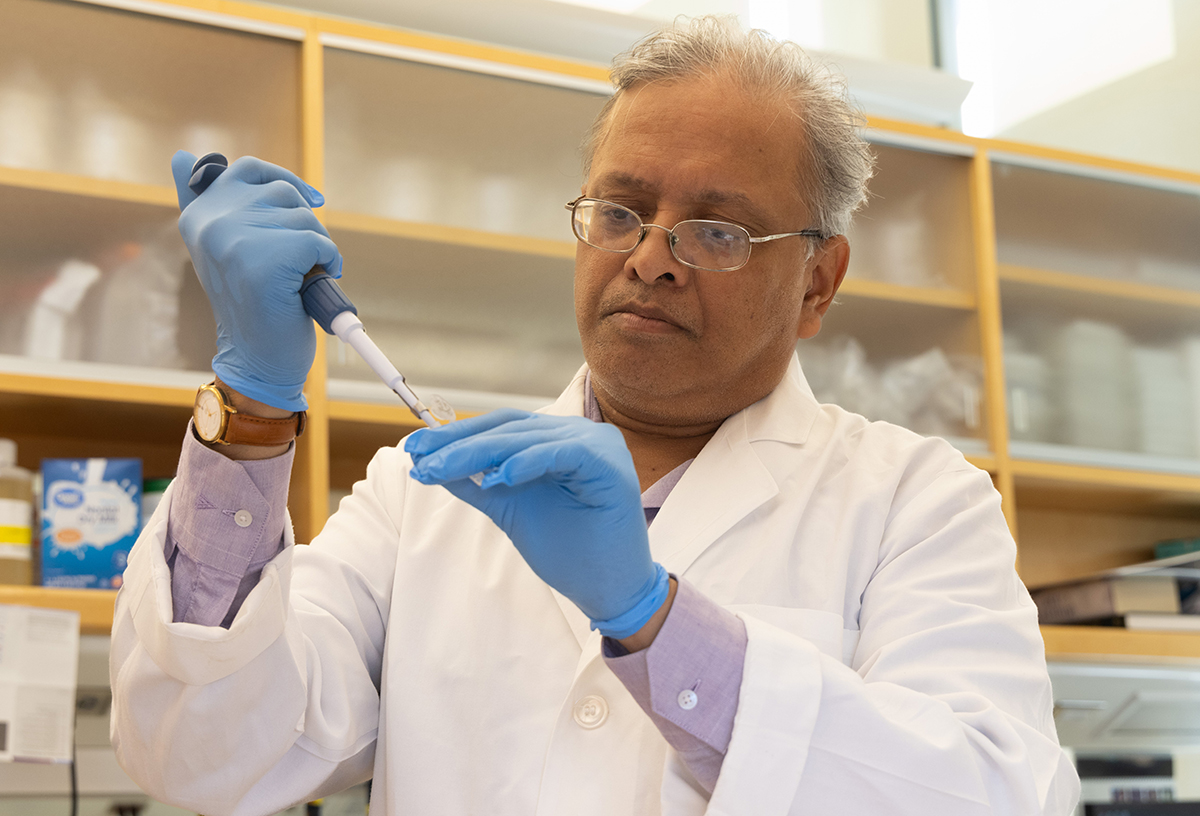University of South Alabama awarded NIH grant to develop blood test for triple-negative breast cancer
MOBILE, Ala. – With a grant from the National Institute on Minority Health and Health Disparities (NIMHD), researchers at the USA Health Mitchell Cancer Institute and the University of South Alabama are developing a blood test for early detection and recurrence prediction of triple-negative breast cancer (TNBC), an aggressive subtype of the disease that disproportionately affects Black women.
TNBC, which is difficult to diagnose in the early stages, grows and spreads rapidly and often recurs after treatment. “The development of noninvasive or minimally invasive early detection strategies and new lines of treatment is urgently needed,” said Santanu Dasgupta, Ph.D., who is principal investigator of the project.
Dasgupta, a cancer researcher at the Mitchell Cancer Institute and an assistant professor of pathology at the Frederick P. Whiddon College of Medicine, was awarded $423,500 from the NIMHD, part of the National Institutes of Health, to study mitochondrial DNA mutations in the blood of patients diagnosed with triple-negative breast cancer.
Mitochondria are tiny organelles and the “powerhouse of the cell,” producing more than 90% of the cellular energy. Mitochondria are unique in that they have their own DNA, which comes from the mother in humans. Mitochondrial DNA (mtDNA) often undergoes mutation in a way to favor cancer cells’ growth and spread.
“We identified a unique pattern of mtDNA mutations in the tumors of triple-negative breast cancer patients for the first time,” Dasgupta said. “We further discovered that 82% of the most frequently occurring mtDNA mutations that are present in the tumors are also detectable in small vesicles that travel in the blood of these patients.”
Interestingly, Dasgupta added, the majority of these frequently occurring mtDNA mutations were also detected in the circulating extracellular vesicles of highly aggressive pancreatic cancer patients. “Thus, mtDNA mutation detection could be a useful tool for minimally invasive liquid biomarker development for aggressive cancers,” he said.
Based on the findings of a previous study conducted at the Mitchell Cancer Institute, the University of South Alabama submitted a nonprovisional patent application for the development of a novel mtDNA detection platform using blood samples from patients. The funding from the NIMHD will allow Dasgupta and his lab team to collect blood samples from a larger number of cancer patients to test the panel of mitochondrial markers.
The ultimate goal of the research, Dasgupta said, is to develop an mtDNA-based simple blood test to detect cancer in the localized stage and closely monitor the patients to trace any potential spread. The test could be used alone or in combination with mammography-based screening for routine or periodic evaluation of women at risk for TNBC.
“This will help us not only in disease prevention but also increase the overall survival of patients with a diagnosis,” Dasgupta said.
Co-investigators of the research project are Elliot Carter, M.D., formerly a professor of pathology at the Whiddon College of Medicine, and Paramahansa Pramanik, Ph.D., an assistant professor of mathematics and statistics at the University of South Alabama.
—
Photo: Santanu Dasgupta, Ph.D., a cancer researcher at the USA Health Mitchell Cancer Institute and an assistant professor of pathology at the University of South Alabama Frederick P. Whiddon College of Medicine, is the recipient of a $423,500 grant from the National Institutes of Health. The goal of Dasgupta’s research is to develop a blood test for early detection and recurrence prediction of triple-negative breast cancer (TNBC), an aggressive subtype of the disease.

Stay Connected
Fill out and submit the form below to get regular updates from Mobile Chamber delivered directly to your inbox.






